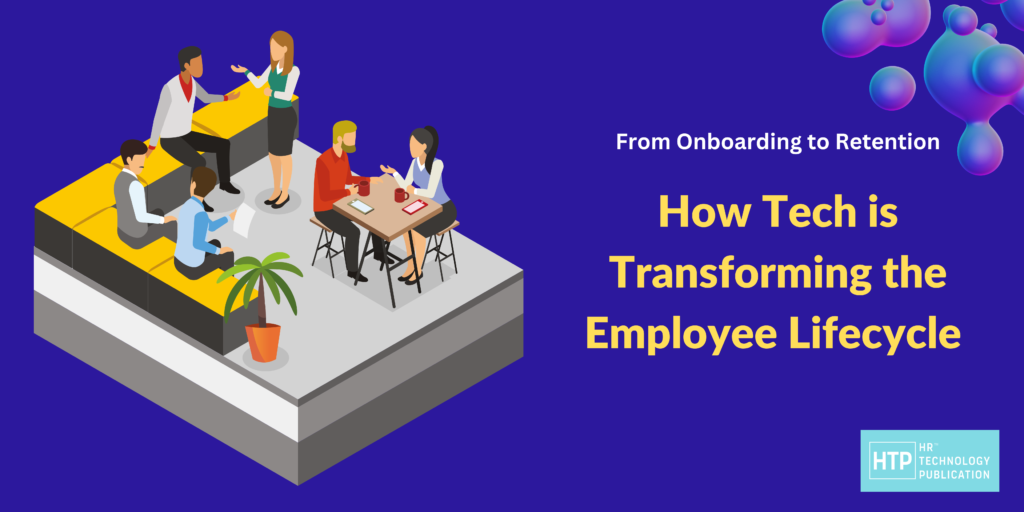In today’s fast-paced business world, the process of hiring and retaining top talent has become increasingly competitive. Human Resources (HR) departments are continually seeking innovative ways to streamline operations and create a more engaging work environment. Technology, particularly HR tech, has emerged as a pivotal player in revolutionizing the entire employee lifecycle, from onboarding to retention. In this blog, we’ll explore how technology is transforming the employee lifecycle, enhancing efficiency, engagement, and overall success.
Onboarding:
Paperless Onboarding: Traditional onboarding typically involves stacks of paperwork, which could be time-consuming and cumbersome. HR tech solutions offer paperless onboarding, allowing new hires to complete forms electronically, reducing the environmental impact and saving valuable time.
Self-Service Portals: With HR technology, companies can create self-service portals where employees can access important documents, company policies, and training materials. This not only reduces administrative work for HR but also empowers employees to take control of their own onboarding process.
Personalized Training: Technology enables the creation of personalized training modules. New employees can access relevant training materials and resources tailored to their specific roles and responsibilities. This ensures they have the knowledge and skills they need to be productive from day one.
Social Integration: HR tech can facilitate social integration by connecting new hires with colleagues, mentors, and relevant teams. This not only accelerates the integration of new employees into the company culture but also helps build a support network from the start.
Performance Management:
Objective Metrics: Technology allows for the collection of objective performance metrics. This means that performance evaluations are based on quantifiable data rather than subjective opinions, reducing biases and promoting fairness.
Real-time Feedback: Continuous feedback mechanisms, often facilitated by tech tools, enable managers to provide real-time feedback to their team members. This immediate feedback allows employees to make necessary adjustments quickly and fosters a culture of continuous improvement.
Goal-Tracking Software: Employees can use goal-tracking software to set, track, and manage their objectives. This aligns their work with the company’s strategic goals, ensuring that everyone is working toward a common purpose.
Predictive Analytics: Technology can provide predictive insights into performance trends. By analyzing historical data and identifying patterns, HR can make data-driven decisions about promotions, rewards, and areas of improvement.
Employee Engagement:
Feedback Loops: Regular surveys and feedback mechanisms, often facilitated by HR tech, allow organizations to understand employee sentiments and concerns better. This information helps HR and management address issues swiftly, improving engagement.
Communication Platforms: Tech platforms offer a variety of communication tools, from instant messaging and video conferencing to social intranets and collaboration software. These tools enhance communication and connectivity among employees and management.
Wellness Programs: Many HR tech solutions include modules for wellness programs. These programs encourage physical and mental health, which, in turn, boosts overall employee well-being and engagement.
Recognition Systems: Technology enables the implementation of employee recognition programs, making it easier to acknowledge and reward employees for their contributions. This recognition is a powerful motivator that can significantly enhance morale and engagement.
Retention:
Data-Driven Insights: HR tech solutions collect and analyze data to identify patterns related to employee turnover and retention. This data provides valuable insights into why employees may leave or stay, enabling companies to implement targeted retention strategies.
Learning and Development Programs: HR technology facilitates the creation of personalized learning paths for employees. These paths encourage career development and skill enhancement, increasing job satisfaction and, consequently, retention.
Exit Interviews: Automated exit interviews conducted through technology can gather feedback from departing employees. This feedback offers valuable insights into why employees choose to leave, helping companies address underlying issues and improve retention strategies.
Predictive Analytics: By analyzing data, HR tech can predict which employees may be at risk of leaving. These insights allow HR to intervene proactively, offering support, resources, or adjustments to retain valuable talent.
Conclusion:
HR technology has a transformative impact on every stage of the employee lifecycle. It simplifies onboarding, streamlines performance management, fosters employee engagement, and equips HR with the tools to tackle retention challenges proactively. As we move into the future, the integration of artificial intelligence, virtual reality, blockchain, and machine learning will further revolutionize these processes, creating a more efficient, engaged, and satisfied workforce. This transformation is an ongoing journey with vast potential for enhancing the employee experience and, ultimately, the success of businesses.


